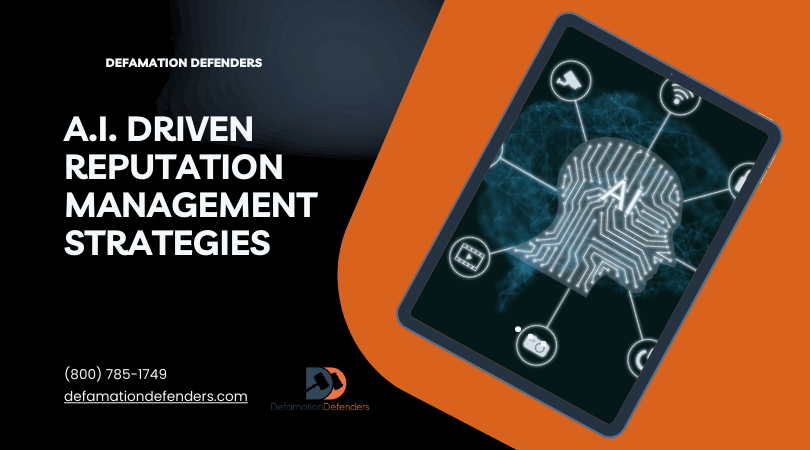Table of Contents
AI-driven Online Reputation Management Strategies

Welcome to our blog, where we delve into the exciting world of digital trust and explore how artificial intelligence (AI) can revolutionize online reputation management. In an era defined by constant connectivity, building trust in the digital realm has become paramount for businesses and individuals alike. Today, we will unveil a series of cutting-edge strategies powered by AI that have the potential to enhance digital trust like never before. Join us on this journey as we unravel how these innovative approaches can shape reputations, amplify credibility, and ultimately drive success in this rapidly evolving digital landscape.
Introduction to Online Reputation Management
As the world increasingly moves online, so too does our reputation. What was once a relatively private affair is now publicly available for anyone with an internet connection to see. And with the rise of social media, it’s easier than ever for anyone to voice their opinion about you or your business – whether it’s positive or negative.
This is where online reputation management (ORM) comes in. ORM is the process of monitoring, managing and responding to what is being said about you or your business online. It’s about protecting and improving your reputation in the digital world.
There are a number of different ORM strategies you can use to achieve this, but one of the most effective is through the use of artificial intelligence (AI). AI-driven ORM can help you proactively monitor and manage your online reputation, protecting you from potentially damaging negative content and promoting positive content to help improve your overall digital trustworthiness.
If you’re looking to enhance your digital trustworthiness and protect your reputation online, then AI-driven ORM is definitely something you should consider.
What is AI?
Artificial intelligence (AI) is a branch of computer science that deals with the creation of intelligent agents, which are systems that can reason, learn, and act autonomously. AI research deals with the question of how to create computers that are capable of intelligent behaviour.
In practical terms, AI applications can be deployed in a number of ways, including:
1. Machine learning: This is a method of teaching computers to learn from data, without being explicitly programmed.
2. Natural language processing: This involves teaching computers to understand human language and respond in a way that is natural for humans.
3. Robotics: This involves the use of robots to carry out tasks that would otherwise be difficult or impossible for humans to do.
4. Predictive analytics: This is a method of using artificial intelligence to make predictions about future events, trends, and behaviours.
The ultimate goal of AI research is to create systems that are capable of general intelligence, which is the ability to reason flexibly and solve problems in new and unexpected situations.
How AI can help with Online Reputation Management
As the internet continues to grow and evolve, so does the need for online reputation management (ORM). ORM is the process of managing an individual or organization's public image online. This can be done in a number of ways, but most often includes monitoring search results, managing social media accounts, and responding to negative reviews or comments.
AI can help with ORM in a number of ways. Perhaps the most obvious is through automated monitoring of search results and social media. AI can be used to quickly identify any negative mentions of an individual or organization, and can even provide insights into why those mentions are occurring. This information can then be used to take proactive steps to address the issue and improve the online reputation.
In addition, AI can also be used to generate automatic responses to negative reviews or comments. These responses can be personalized to each situation, which can help show that the individual or organization is taking the time to address each issue directly. Additionally, AI-generated responses can help identify patterns in customer feedback, which can be used to make further improvements to the product or service being offered.
AI can be a powerful tool for helping manage an online reputation. By automating some of the more tedious tasks related to ORM, AI can free up time so that individuals and organizations can focus on more strategic tasks. Additionally, AI-generated insights can help identify issues early on and prevent them from becoming bigger problems down the line.
Benefits of Using AI for ORM
The online Reputation Management (ORM) industry is growing at a rapid pace. According to a report by MarketsandMarkets, the ORM market is expected to be worth $6.84 billion by 2025, up from $2.88 billion in 2020.
There are many reasons for this growth, but one of the most important is the increasing use of artificial intelligence (AI) for ORM. Here are some of the benefits of using AI for ORM:
1. Automated monitoring and analysis: AI can help you automatically monitor your online reputation and identify any negative sentiment or comments that need to be addressed. This can save you a lot of time and allow you to quickly take action to improve your reputation.
2. Improved accuracy: AI-based tools can provide more accurate results than manual methods, meaning you can trust their insights and recommendations.
3. Greater insight: AI can help you gain greater insight into what people are saying about you online, including identifying any patterns or trends. This data can be used to improve your overall ORM strategy.
4. Increased efficiency: Using AI for ORM can help you save time and resources as it automates many tasks that would otherwise be manual. This includes tasks such as social media monitoring, analyzing customer reviews, and more.
5. Better decision making: With access to better data and insights, you can make smarter decisions about your ORM strategy thanks to AI.
Challenges of ORM Strategies Driven by AI
There are a few key challenges that organizations face when they attempt to implement ORM strategies driven by AI. First, it can be difficult to accurately identify the online conversations that are most relevant to your organization and brand. Second, even if you are able to identify these conversations, it can be difficult to monitor and respond to them in a timely manner. You need to have a plan in place for how you will use the data and insights generated by your AI-driven ORM strategy in order to continuously improve your online reputation.
Best Practices for Implementing an AI ORM Strategy
There is no one-size-fits-all answer to the question of how best to implement an AI-driven online reputation management (ORM) strategy. However, there are a few key best practices that can help ensure success.
First and foremost, it is important to have a clear understanding of your goals and objectives for implementing an AI ORM strategy. What are you hoping to achieve? What does success look like? Once you have a good understanding of your goals, you can begin to develop a plan of action.
It is also important to remember that AI is not a magic bullet. It can be a powerful tool in your ORM arsenal, but it should not be the only tool you rely on. A holistic approach that combines AI with other ORM tactics (such as traditional media monitoring and online reputation repair) will likely be the most successful.
Be sure to monitor your AI ORM strategy regularly and make adjustments as needed. The landscape of online reputation management is constantly changing, so it is important to stay on top of new developments and trends. By monitoring your strategy and making adjustments as necessary, you can ensure that your AI ORM efforts are always working towards your specific goals and objectives.
Concluding Remarks on the use of AI in ORM
In conclusion, AI-driven online reputation management strategies can play an important role in enhancing digital trust and reducing the risk of cyber threats. By implementing these effective reputation management tactics, organizations can gain insight into their customers’ behaviors and preferences to build more meaningful relationships with them. Furthermore, businesses can leverage AI technology to quickly identify potential security issues that could occur on their platforms and take steps to protect their customers’ data accordingly. Ultimately, by leveraging advanced artificial intelligence techniques for online reputation management, organizations will be able to increase customer engagement while simultaneously boosting both customer loyalty and retention rates.
More from our blog
Looking for more useful info on the latest advancements in online reputation management, or advice on how to use reputation management strategies to improve your online image? Look no further than our ORM blog, packed full of actionable articles and insight on everything you need to know about managing your online reputation and removing unfavorable content from the internet.
If you enjoyed this post, you may also like these:






